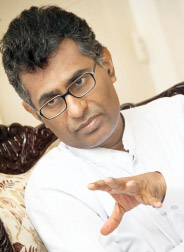Attitudinal change vital in energy conservation drive
By Jaliya WIJEYEKOON
 Electricity is a basic need of modern human beings. The Government of
Sri Lanka is in a position to satisfy this basic need at an affordable
price mainly due to 40 years of untiring efforts of a person who lived
during the first half of the 20th century. This person is none other
than D. J. Wimalasurendra, the father of hydro power in Sri Lanka. Electricity is a basic need of modern human beings. The Government of
Sri Lanka is in a position to satisfy this basic need at an affordable
price mainly due to 40 years of untiring efforts of a person who lived
during the first half of the 20th century. This person is none other
than D. J. Wimalasurendra, the father of hydro power in Sri Lanka.
He started by demonstrating a technical option he believed in. He
initiated the first mini hydro power plant in Sri Lanka (then Ceylon) in
1912 at Black Pool, using excess water from the Gregory Lake, Nuwara
Eliya.
In 1918, Wimalasurendra delivered a keynote address to the
Engineering Association of Ceylon titled ‘Economics of Power Utilisation
in Ceylon’. In this address he highlighted that the harnessing of the
Mahaweli River, Kehelgamu Oya, and Maskeli Oya for hydropower
development would inaugurate an industrial era in this country.
The Aberdeen - Laxapana hydro power scheme commenced in 1924, but
took almost two and a half decades to be completed and commissioned due
to various unforeseen circumstances including the Second World War.
Sixty years passed by. During this period successive Sri Lankan
governments tapped almost all the hydro potential in Sri Lanka to
provide electricity to the people of the country.
However, hydro power generation was not sufficient to cater to the
ever increasing demands of consumers and thermal and coal power projects
were also commissioned to supplement the needs.
According to the latest statistics, over 92 percent of the people in
the country enjoy the facility of electricity and the government intends
to provide the service to all Lankans before the end of this year.
However, it should be stated that it is a gigantic task faced by the
present government as the electricity demand is increasing at an
unprecedented rate especially after the eradication of terrorism in
2009.
Infrastructure facilities in this regard have been provided by the
Government to almost all parts of the country. The influx of foreign
investments to the country and the population explosion over the last
few years had been the principal reasons for the excessive demand for
electricity at present.
With limited resources to further develop hydropower, and with the
alarmingly escalating fuel prices, the Government is forced to take
various measures to conserve electricity while pleadging to provide
electricity to all countrymen by the end of the year.
 The Sunday Observer had an exclusive interview with the Minister of
Power and Energy Patali Champika Ranawaka to ascertain the measures
taken by the Government to conserve electricity to avoid an impending
crisis. Excerpts are given below: The Sunday Observer had an exclusive interview with the Minister of
Power and Energy Patali Champika Ranawaka to ascertain the measures
taken by the Government to conserve electricity to avoid an impending
crisis. Excerpts are given below:
Q: Sri Lanka largely depends on hydro-electricity for its power and
energy demands. With the decline of annual rainfall levels, what are the
prospects of traditional sources of power generation?
A: Well, we have already exploited almost all hydropower generation
capacities in the country. The rainfall during both monsoons of last
year was the lowest in 50 years, leading to immense problems in
generating hydropower, with the constant changing of climatic conditions
it is not possible for us to largely depend on hydropower. The most
viable and remedial measure is to conserve electricity as much as
possible.
Q: Public demand for power is always on the increase with the
population explosion. What does the future hold for us in this regard?
A: Yes, if you analyse the power requirements in the country on a
regional basis, prior to the termination of terrorism the average
requirement of the island was around seven to nine percent. However,
since 2010, upto the present, electricity demand in the Eastern Province
has increased to 70 percent while demand for electricity has risen to 90
percent in the Northern Province.
We have been spending billions of rupees to provide this facility
mainly to these two provinces during the last two years. We have
provided electricity to a large number of remote areas in the rest of
the island during the last two years.
Q: We are generating thermal power to supplement the shortfall. How
costly is this exercise?
A: The cost of thermal power has skyrocketed during the last few
years and has escalated sixfold compared to the last three years. With
fuel costs going up regularly, it is not possible for us to sustain our
electricity unit costs any longer.
Q: Coal power is considered a cheap source of power generation. If it
is so, what was the difficulty for the Indian-funded coal power station
at Sampur to get off the ground?
A: Coal is not cheap in the world market today. It is a myth to
believe that coal power would be cheap. When you assess and analyse the
cumbersome process involved in coal power generation, you would see that
the unit cost of power generated by coal is similar or even higher than
that of hydropower. It was cheap about 20 years ago, but not now.
Q: Energy conservation is a prime need for energy-hit Sri Lanka. Can
we be optimistic about the energy conservation culture and the degree of
commitment shown by the public?
A: We have embarked on two energy conservation programs to educate
the public about the necessity of energy conservation. Eg - short-term
and long-term plans.
Short-term plan
1. We requested all house holders to switch off at least one lamp and
shut down the refrigerator for one hour per day between 6.30 p.m. and
9.30 p.m.
2. We have introduced competitions among schoolchildren, in their
schools and houses, to minimise the use of electricity, we offer
lucrative prizes.
3. All local bodies in the island have been informed to save
electricity as much as possible and not to waste electricity on street
lighting unless at essential locations.
Long-term plans
1. To educate all stake-holders about the impending scarcity of
electricity, in future and to create an attitudinal change in the minds
of the people in conserving electricity.
2. Power pirates will be strictly dealt with by imposing severe
punishments including long-term imprisonment. Laws should be amended to
combat this menace.
3. Institutions, organisations and local bodies which exceed the
permitted consumption levels will be surcharged and the institutional
heads will have to bear the additional cost.
4. We may be compelled to charge at least a nominal fee from places
which had so far been exempted from paying fees.
Q: Why doesn’t your ministry introduce a war-footing-like situation
to conserve the country’ energy?
A: Yes, we will be reluctantly compelled to take some stringent
measures unless the public adhere to our modest requests. However, I
firmly believe that people will realise the imminent danger of wasting
electricity and start reducing their consumption soon.
Q: Even when alternate resources such as firewood are available,
people simply use electricity for their household needs. Why don’t we
devise a system to exploit alternative resources, such as that in India?
A: This is why I say that there should be attitudinal change in our
people. Even people from very remote areas waste electricity when they
have alternative sources such as firewood.
Q: Do you still encourage private entrepreneurs to embark on mini
hydro power projects?
A: Yes, we have issued a substantial number of permits to private
entrepreneurs, but some of them have not lived upto our expectations
while some have sold their permits to third parties. We are going to
streamline a mechanism to get the desired results soon. Those who have
not properly executed the projects will be punished and the projects
will be taken over by the government.
Q: Ceylon Electricity Board employees conducted a major protest
sometime back over various issues. Has the tension eased now or what is
happening there?
A: The power and energy sector is enveloped by a ring of mafia and it
is not only the duty of the minister to see to this unfortunate
situation. The entire Cabinet would co-operate to wipe out this menace.
Q: As the minister in charge, your efforts in conserving electricity
and guiding your workforce to follow suit can be appreciated. However
some Parliamentarians are squandering electricity on various tamashas
and entertainment activities, paying scant regard to your humble
requests. What have you got to say about them?
A: Everybody will realise their follies one day. |

